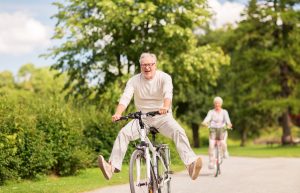Transforming Your Sleep Through Good Habits
Living with sleep apnea can be exhausting and dangerous to your health. This common sleep disorder causes breathing to repeatedly stop and start during the night, preventing you from getting truly restful, restorative sleep. As a dentist in Auburn, IN, focused on protecting my patients’ health and well-being, Dr. David Painter and his team at Auburn Family Dentistry often work with those diagnosed with obstructive sleep apnea.
While continuous positive airway pressure (CPAP) devices are often an effective medical treatment solution, for some patients, lifestyle adjustments can make a meaningful difference in reducing the severity of sleep apnea. Through healthy lifestyle habits, those suffering from mild to moderate cases of sleep apnea may find relief through natural means.
Ready to create a better night’s sleep? Call (260) 357-2380 today to schedule your consultation at Auburn Family Dentistry.
Weight Loss for Sleep Apnea Sufferers

Studies show that a small reduction in body weight can significantly reduce the effects of sleep apnea. Many sleep dentists advise their patients to strive for a healthy target weight through regular exercise, counting calories, and sticking to nutritious whole foods. Small milestones like losing a couple of pounds at a time eventually add up to big results. Weight loss is often the first recommendation for mild sleep apnea cases.
Alcohol and Muscle Relaxant Avoidance
Alcohol and muscle-relaxing sedatives promote increased collapsing of airways during sleep. These substances cause excessive throat and airway muscle relaxation. For those prone to sleep apnea, avoiding alcohol for three to four hours before bedtime allows muscle tone to return and helps prevent airway obstruction episodes through the night.
Individuals using sleep aids or muscle relaxants should consult their physician, as alternative remedies may better suit their needs. Tracking occurrences and timing can help determine if such substances negatively impact sleep quality.
Optimize Sleep Position
Sleeping on your side instead of your back can help keep airways open for those with mild positional sleep apnea. Side sleeping minimizes soft tissue compression in the throat. Some find pillow props, a pillow between the knees, or even taping tennis balls to the back of sleep shirts effective at keeping them from rolling onto their back during sleep.
Getting accustomed to side sleeping often takes time and determination. An adjustable bed frame allowing you to raise your head while sleeping on your back can also help maintain open airways.
Quit Smoking
For those who smoke, quitting can significantly help reduce sleep apnea severity. Smoking is known to cause inflammation and fluid build-up in throat tissues, while irritating nerves involved in airway reflexes. This swelling narrows upper airway diameter while dulling reflexes that reopen airways.
Smoking also increases your blood carbon monoxide levels, reducing the oxygen needed for tissue and muscle tone healing during the overnight repair process. Quitting allows your body to restore healthy functioning, potentially eliminating mild sleep apnea effects.
Oral Appliance Therapy
Custom-made oral sleep apnea appliances work to keep airways open by bringing your lower jaw forward during sleep. Your Auburn dentist takes jaw impressions and sends them to a lab where technicians create a unique mouth guard suited to your bite.
Oral devices are discreet, convenient, portable, and much less cumbersome for travel compared to CPAP machines. Oral appliance therapy is quiet and prevents air leaks or irritation from CPAP masks. This treatment is a great option for mild to moderate sleep apnea patients looking to avoid surgery or more invasive interventions.
Healthy Lifestyle Habits

Supplements like melatonin, magnesium, and herbal remedies can support quality sleep. Some studies suggest playing musical instruments like the didgeridoo builds throat muscle tone and control through circular breathing techniques. Lifestyle approaches often work best alongside primary medical or dental sleep apnea treatments.
Seeking Ongoing Care
Re-examination and testing to gauge sleep apnea severity help motivate patients to implement lifestyle measures. Follow-up home sleep tests or lab studies offer insight into which changes make the biggest difference in an individual’s case. Adjustments to treatments or recommendations keep improvement on the right trajectory.
Relying on a knowledgeable sleep professional reasserts commitment to consistency when motivation lags. Ongoing support empowers patients to take control of health factors within their power to unlock a better quality of life.
Get Better Sleep At Auburn Family Dentistry
To learn more about sleep apnea risk factors, testing options, and custom treatment planning catered to your circumstances, contact our Auburn dental office today. Call Dr. David Painter at (260) 357-2380 to request your consultation. Our entire staff looks forward to helping you achieve restful sleep and improved health.
